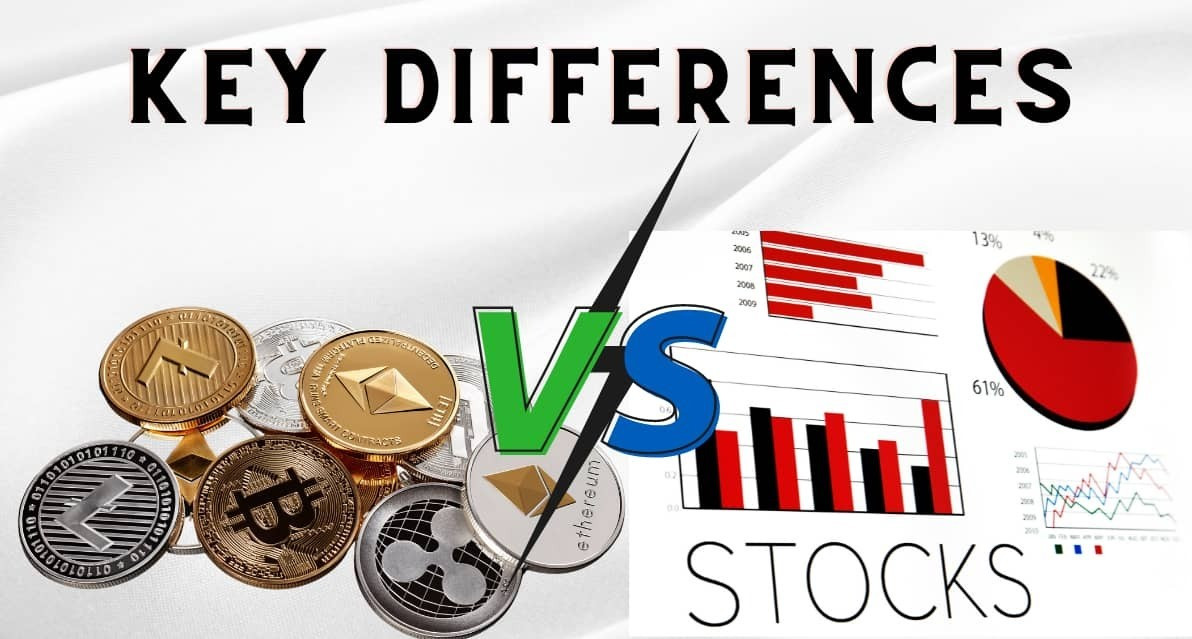Crypto vs Stocks: What's the Difference?

Key Points
- Stocks are a long-established asset class used as a vehicle for making profit. They also give the holder partial ownership over the company and in some cases, any future earnings/losses. Stocks can only be traded during set market hours.
- Cryptocurrency is a newer asset class that leverages blockchain technology to verify and secure transactions. These digital currencies are usually attached to projects attempting to deliver utility or value. Crypto is borderless and can be traded 24/7 without the need of an exchange or intermediary party.
- Both crypto and stocks are susceptible to price volatility.
- Crypto and stock markets have a diversity of assets available for trade, with leading crypto assets tending to have both real-world and Web3 utility.
What is Cryptocurrency?
Cryptocurrencies are digital currencies powered by blockchain technology. This technology works to verify and secure transactions. Most cryptocurrencies run on decentralised networks, meaning they’re not subject to centralised or direct government control.
Bitcoin is usually the first thing that comes to mind when people think of crypto. Created in 2009, Bitcoin is the first and most well-known crypto. Since its release, tens of thousands of other coins have followed in its footsteps. These iterative currencies are often referred to as altcoins, short for “alternative coins”.
In most cases, these digital currencies are linked to a specific project attempting to deliver utility or value. For example, Ether (ETH)—the crypto that is native to the Ethereum blockchain—is essential for facilitating transactions and the creation and use of various applications across the network. Other examples of crypto include Solana, Cardano, and Tether.
What is a Stock?
A stock is a type of financial instrument known as a security. Stocks are usually equity or hybrid securities, giving the stockholder some form of ownership in a corporation. It also represents partial ownership of the company’s assets and future earnings.
Stocks fall under two main categories: common and preferred.
Common stock is what most people think of when they think of stocks. Owners of common stock can cast a vote on corporate matters. Their voting power is usually proportionate to the amount of stock they own. Common stock owners also share a portion of the company’s profits and/or losses, and can receive dividends in certain circumstances.
Owners of preferred stock do not have voting rights. If the corporation goes into liquidation though, these shareholders will be the first to receive dividends and/or company assets.
A simple formula can be used to determine the value of a company’s stock: Number of Shares x Current Share Price = Stock Value
Crypto vs Stocks: The Key Differences
Investors use both crypto and stocks as investment vehicles for generating wealth. But there are some key differences between both forms of investing.
Although some crypto projects offer voting rights in the form of a governance token, or operate as a decentralised autonomous organisation (DAO), investing in crypto doesn’t mean you have partial ownership of a project. Crypto projects also do not offer dividends. Instead, one can lend or stake their crypto for passive income. Staking crypto over a period of time will net the investor a return equal to the yield offered by the platform or service they use.
Lastly, crypto markets never sleep. Unlike traditional markets that trade between set hours on a Monday-Friday schedule, such as the NYSE, the crypto market is always live for trading. Some exchanges around the world have limited open hours on the weekend, but it’s very uncommon.